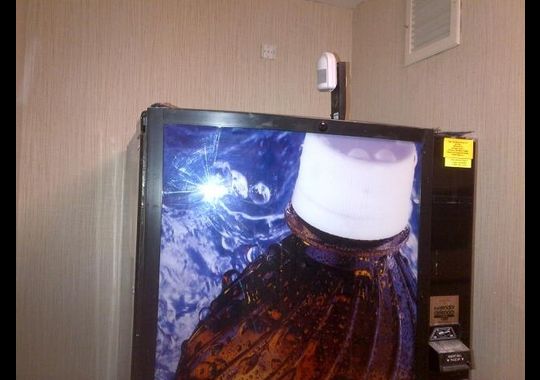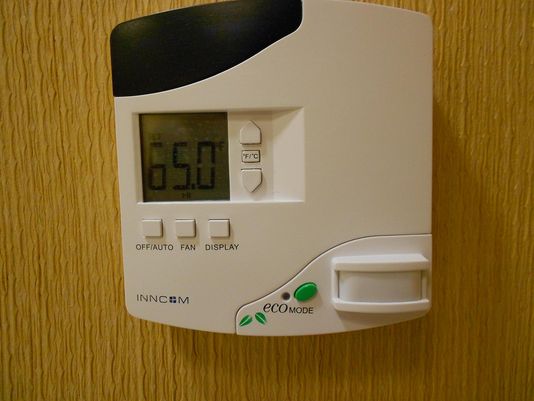Companies share energy efficiency secrets
When hotel guests leave their room during the day, a magnetic door sensor tells the thermostat to reduce the heating or cooling. When they come back, it has the temperature return to their selected degree.
The programmable thermostat is one of several energy-efficiency features installed last year at the Marriott La Jolla in La Jolla, Calif. The hotel also uses motion sensors on stairwells and vending machines to keep lighting dim when not in use.

In 2012, the Marriott La Jolla in La Jolla, Calif., installed energy-efficient features including vending machines with motion sensors that keep the lighting dim until a hotel guest wants to buy something.(Photo: Courtesy of HEI Hotels , Resorts)
"We save $5 million per year" on utility bills company-wide with such retrofits, says Bob Holesko, vice president of facilities at HEI Hotel & Resorts, which owns the La Jolla property and 40 others in 16 states. He says basic steps such as programmable thermostats pay for themselves, by lowering energy use, within three years.
His company is one of three dozen -- including Best Buy, General Electric, Macy's and Staples -- that have pledged not only to cut energy use 20% by 2020 but also to share their secrets for success as part of a new federal program that's releasing its first-year results today.
More than 110 partners -- including schools, universities and cities, such as Atlanta, Chicago, Los Angeles and Seattle -- have signed on to the voluntary Better Building Challenge, launched by President Obama in December 2011. They've created at least 50 projects to showcase their strategies, cut energy use per square foot more than 2.5% in the first year and lined up $1.1 billion in private funds for efficiency upgrades.
"We waste a lot of the energy we use," says Maria Vargas, director of the program at the Department of Energy, which provides technical but no financial help to its partners. She says retrofits such as swapping out incandescent light bulbs for ultra-efficient LEDs (light-emitting diodes) can cut energy usage 20% to 30%, save money and reduce greenhouse gas emissions. In other words, she says, they're a win-win.
Unlike some aspects of Obama's "all-of-the-above" energy strategy, efficiency has garnered broad support. A bipartisan bill in Congress to improve the efficiency of appliances, buildings and corporate supply chains passed a Senate panel earlier this month on a 17-3 vote. It now moves to the Senate floor.
The legislation, proposed by Sen. Jeanne Shaheen, D-N.H., and Sen. Bob Portman, R-Ohio, is backed by environmental groups, as well as the Chamber of Commerce and the National Association of Manufacturers.
Vargas says the DOE program aims to provide strategies, already proven by leaders in energy efficiency, that other organizations can follow. She says the trick was getting companies to share data and tips -- a sort of playbook -- for what works.
Holesko says HEI Hotels & Resorts initially hesitated to disclose details of its signature dashboards, which post energy usage in its buildings. "It's always been our baby," he says, noting how helpful it's been in lowering utility bills. Still, he says the company decided, "it's something we have to share."
In its hotel guest rooms, IHG (InterContinental Hotels Group) also uses LEDs, programmable thermostats, motion sensors and Energy Star-certified microwaves, refrigerators and TVs. It's taken other steps, too, that guests won't see, such as improving the insulation of its walls and water tanks.
A Walgreens in Goodyear, Ariz., installed 29 skylights last year with interior solar panels that track the sun's position and move mirrors to increase the natural light that enters the building. Walgreens is building a store in Evanston, Ill., scheduled to open around Thanksgiving, that aims to produce as much energy as it uses. It will have 250 rooftop solar panels, two wind turbines and geothermal wells for heating and cooling.
Partners including Alcoa and Kohl's, which has solar panels on many of its retail stores, have another strategy. For some employees, they tie performance reviews and pay increases to energy savings.










